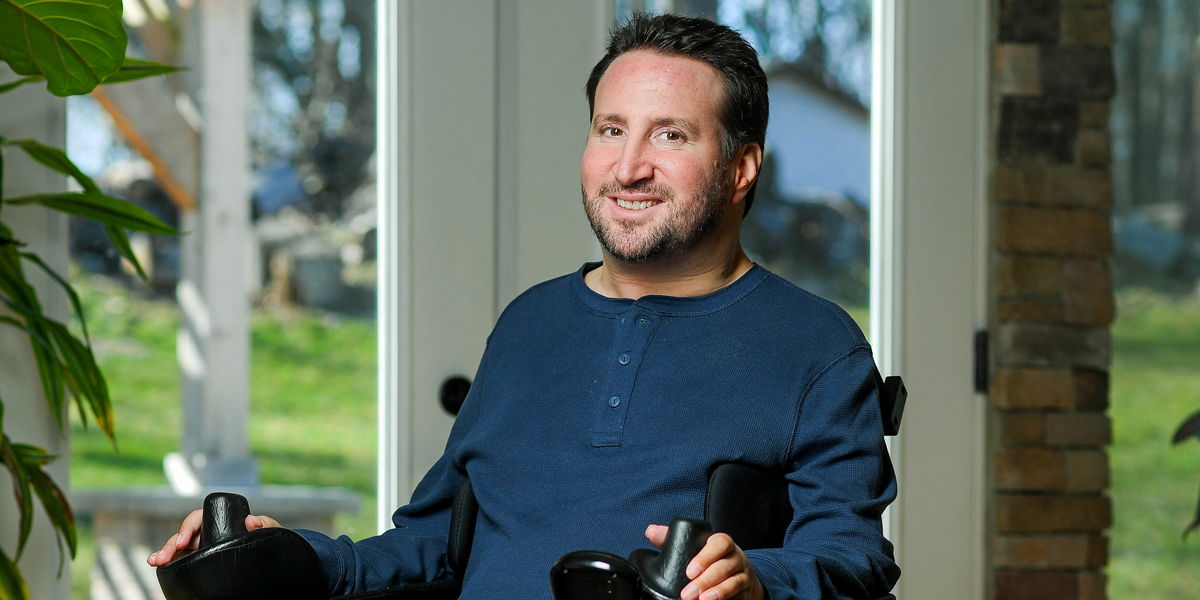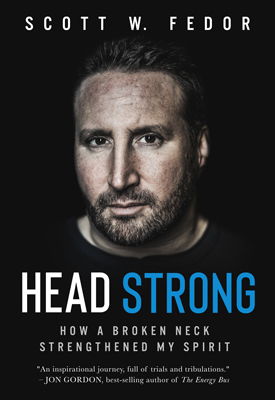Adversity to Advocacy
Scott Fedor (Lehigh University, 1998) knew he’d have lifelong friendships through the Fraternity—friendships that further proved to be enduring following a serious injury in 2009.

Fedor was on track with a successful marketing career. After he graduated from Lehigh with a B.S. in finance, he earned an MBA from the Ross School of Business at the University of Michigan and worked for several companies, both domestic and international. Then, in 2009, while spending the July 4th weekend at his ex-wife's parent's cottage, he dove into shallow water and broke his neck.
“It put my life into a totally different direction as far as what I thought were my plans and my career path. All that had to be reevaluated and reassessed. I focused on just learning how to live and how to survive because it was a high-level injury—a C3 break that left me completely paralyzed from the shoulders down. Obviously, a drastic change.”
After the accident one of the first people to visit Fedor in the hospital was a Delta Tau Delta brother, Bryan Fecteau (Lehigh University, 1998). “He flew up to Michigan where I was in the hospital and was with me during those first couple days, during the worst of it,” Fedor said. “Ultimately, I was transferred back to Cleveland where I went to rehab and worked on my recovery. Bryan continued to come to visit every couple of months, spent time with me and continued to encourage me.”
Fecteau also began organizing Delta Tau Delta tailgates where brothers far and wide come together in support of Fedor and have donated funds to help with medical expenses and physical therapy.
“Fortunately, I had a strong friend and family network, including my brothers who were able to contribute and help me deflect some expenses with financial donations. That's what got me thinking it's unfair for all the other individuals who have to go through this but don't have the financial needs or the support network,” Fedor said.
With this in mind, Fedor turned his marketing business skills toward advocacy, creating the Getting Back Up Foundation in 2011. The Foundation’s mission is to help those living with spinal cord injuries improve their quality of life today by providing goods and services which can help make a difference in their immediate situation. In short, Getting Back Up helps bridge the gap, when insurance fails to provide the tools needed to truly improve their quality of life. The Foundation provides qualified individuals with funding for participating in exercise-based recovery programs and the purchase of adaptable products. Both the program and products have proven to greatly improve the physical and emotional well-being of the injured individuals.
Fedor also serves on the board of LEAP (Linking Employment, Abilities and Potential) which services individuals with disabilities, as well as an organization out of Los Angeles called Adversity 2 Advocacy which Fedor describes as a LinkedIn for an advocacy network that brings together people and connects them with others who face similar issues.
“I had been the beneficiary of a lot of support from others and found myself wanting to try to help others and be a resource for others that were going through similar issues,” Fedor said.

Two years after his injury Fedor had an opportunity to speak at an annual spinal cord injury forum. It was the first time he’d told his story to a large group and he shared the lessons he’d learned. “So that was kind of the first time I really got up there, told my story to a large group and shared lessons I had learned. And that was probably my first foray into the motivational speaking arena and I really just loved it, enjoyed it, but I didn't go seeking it,” Fedor said.
He began to do more public speaking and published a memoir, Head Strong, in July 2019 on the 10th anniversary of his injury. “It’s told in three parts, how I took the challenge, what I did with it and where I am now. So it's a memoir but it also reads like a motivational story, an inspirational, strong, spiritual story,” Fedor said.
He wrote the first part of his book, then put it away for about two years. When those who heard him speak encouraged him to tell his story he decided to complete the book. “For a while I didn't really feel I had a story to tell because I was just one of several thousand people who live with this injury. “It was actually other people who said, ‘You may not think it's special, but just hearing you tell it helps people more than you realize.’ So, I wrote the book for others more than myself. But as I got into the writing process obviously it seemed very cathartic. It allowed me to get a lot out there that hadn't been told before, and hopefully for a lot of people ’whether a broken neck or another adversity, they might find something in it that can change their lives.”
“I'm doing exactly what it is I feel I want to be doing and should be doing. Certainly, I've been busy myself with things going on. I hadn't planned for a role like this, but it is kind of one of those things where you have a moment to rethink your career. My career, my path found me. I'm proud of all the advocacy work I do to help those with paralysis and spinal cord injuries across the country,” Fedor said.
